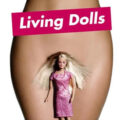6 Meditations Toward an Appreciation of Lynne Savitt

Relics of Lust: New and Selected Poems
by Lynne Savitt
Softcover, $18.95
New York Quarterly Books, 2014
1. To Begin with Freud
There’s a famous (or infamous, and possibly apocryphal) Sigmund Freud quote, which is also posthumously attributed and likely offhand: “The great question that has never been answered, and which I have not yet been able to answer, despite my thirty years of research into the feminine soul, is: What does a woman want?”
The enigmatic doctor was talking to princess Marie Bonaparte, a fellow psychoanalyst, patron, and friend. Under these circumstances, no conversational quip should be taken at face value. Freud may have, after all, been flirting with this fascinating, perplexing colleague and one-time patient. (In her pursuit of a reliable orgasm, it might be noted, Princess Marie underwent surgery to more strategically reposition her clitoris. Freud was reportedly appalled, and the Princess, alas, unsatisfied with the results.)
With the hindsight of a century’s distance, it is clear there’s no reason that Freud’s noted prescriptive for human happiness—love and work—wouldn’t apply to women as well as men. Although one problem with the dictum is that people always seem to want more than that. Another is that Freud’s coin-toss of happiness seems to land so often on its tail side of drudgery and heartbreak. Still, his admission can be taken as, at the very least, an accurate description of his clinical understanding of women. Even after the doctor’s thirty years of research, this new and selected collection of Lynne Savitt’s poems, spanning a career of nearly three decades, might have enlightened him.
2. Words as Pebbles
The poems in Relics of Lust span a succession of chapbooks beginning with Lust in 28 Flavors, published in 1979 when Savitt was in her early thirties, through a section of “New Poems” written in her sixties. The first Lynne Savitt poem I remember reading was in John Bennett’s mimeo magazine, Vagabond, sometime in the late 1980s. It was entitled “Late Mourning” and spoken to a dead lover:
i don’t know who this woman
is, michael, she’s got heavy
legs & sleeps on her stomach
has sex on her back & she’s
satisfied with so little…
…she remembers the exact
date of every small detail
the first day her daughter
wore pantyhose her son
hit a double in little
league the day she met
her 19th lover but she
can’t remember the day
you died without saying
goodbye i wanted to
say it wasn’t all…
As the poem progressed, its language seemed to slow and double back on itself. It forced me to pick up each word like a pebble in a trail, something familiar leading me forward in the work. This was poetry as well as sentiment; language coming alive and talking back to her, finding its own pulse. To return to the last line above:
…say it wasn’t all
bad those black, humid
nights we traveled to
the planetariums in our
heads exploded with
dirty release & it wasn’t
shame
our last meeting
didn’t go as soft as the
day you asked me to
marry a man who
wasn’t a good father
is something I just
couldn’t we meet some
where dreams touch
& you wake in a sweat
of recognition for something
lost goodbye, michael
at last the tears
3 a.m. months later.
This level of subterranean dialogue seemed out of place in Vagabond, a mag that mostly featured post-Bukowski Meat poets. But what school did the poem evoke? Its opacities were still too clear and its emotions too upfront for LangPo or academia. Its metrics were too quirky and un-retro for the Formalists. You could call it Confessional—but there’s a level of control in its wildness, a sense of comfort with its own skin that makes me think of Savitt at her best as a school of one.
3. Work, Love and Rare Meat
Even so, Savitt’s poems seem to have appeared most frequently in the Meat/Outlaw mags that began to spawn in late 1970s. Out of the sixty-some credits listed in the collection’s acknowledgments page, evocative names like Atom Mind, Alpha Beat Soup, Desolation Angels, The Butchers Block, Swamproot, and One Trick Pony outnumber more established journals. But her credits do include many less ephemeral journals, such as William Packard’s New York Quarterly (publisher of the volume in question), The Chiron Review, Painted Bride Quarterly, The Louisiana Review, and Rattle.
For some time, along with the venerable James Mechem, she also co-edited her own small magazine, Caprice. (I was a frequent contributor to Caprice, and Savitt edited a small chapbook of mine under her Gravida imprint.) For most of the period spanned by this collection (or at least as long as I’ve been corresponding with her—since somewhere in the early 1980s) Savitt made her living by working in the accounting department of a suburban New York hospital. A responsible and, from all accounts, often arduous job—but the day job isn’t what the work in this volume’s about.
The chapbook titles from which Relics of Lust was compiled spell her themes out more clearly: Lust in 28 Flavors, Eros Unbound, No Apologies, Dreams as Erect as Nipples on Ice, etc. Savitt’s poetry has little interest in the hamburger of workaday drudgery. Her fascination is the other side of Freud’s prescription, the champagne and filet mignon of love, as in the poem “Simple”:
this is what
i forgot
joy
so creamy you
could float on
this is what
I crave raw
blind need
meat rare
as you
are what
I’ve been missing…
4. The Explicit Implicit
Readers seeking erotica will not be disappointed. There are some poems here as sexually upfront as those eight-pagers of long-ago adolescence. Lines such as these can’t be extracted to quote in a review; they’d be too prurient in that context. [n.b. Not omitted at the request of CF’s editors.] If one is offended by the explicit, however, one probably shouldn’t read Lynne Savitt. Her sex poems are detailed without becoming cartoonish, nor are they self indulgent. They simply are. They’re the central focus of her poems the way nature was for Wordsworth, as in “Ignition”:
…the sweat beads
on his abdomen, something in her
eyes, the tan line on her breast
she touches the zipper on his pants
he grabs her wrist
the nerve fires light, entangle……i light the long slender
blue kitchen match the charcoal
presoaked in lighter fluid will flame
the very second i touch
the stick to anticipating squareslike you today on the phone
when i said, “michael my
cunt is so hot, “ & i heard
your breath quicken you
answered, “say something else,
anything,” but before I could
speak you came…
It’s much more difficult to write a sex poem than a love poem. The poets who can do it successfully seem rare. Among the big names, e.e. cummings comes to mind, as well as Ariana Reines more recently, and of course Bukowski had his say, though his is usually more vulgar than erotic. Many poets write of the body, but when the matter of sex arises, they seem so often to falter.
Since the 1960s, most of the best practitioners of the heterosexually explicit poem seem to be women. Savitt and Lyn Lifshin are notable examples, both of them poets who push the envelope in this area. One of the great innovations of women’s liberation was this sort of gendered table-turning: “shut up and let me talk dirty for awhile. You might learn something you’ll like.” Or as Savitt puts it in her short squib “Love in the Late Sixties”:
i am a pacifist who can spit bullets
rip a man’s heart at ten paces
shake the blood off my lace cuffs
& open the fly of the next
waiting man with my tongue.
5. Love, Marriage, Prison
One thing that Savitt brings to the discussion of lust is female freedom. Desire and bodily fluids are there for the sharing, but ownership is off the table. Savitt is no stranger to marriage and many of her poems reflect day-to-day domestic life. There are sincere, filial dialogues with parents, children, grandchildren. There are poems about care-giving, illness, accidents, death, and dementia. Savitt is a loyal daughter, and a fiercely loving mother. But domesticity as an institution is viewed guardedly, sardonically:
the tiny lump you discover
under your right breast
while powdering
the perfume line
he’ll nuzzle moments before
the plunge…
Savitt’s romantic forays take place in excursions from the marriage bed. Her sometimes-alter-ego, the woman of a certain age, “Mrs. Lattrice”, makes Mrs. Robinson seem downright virginal in “The Undoing of Mrs. Lattrice”:
began slowly with a piercing look
how easy she crumbled his fingers
found her heart hot pulsing in her
pants pulled off so fast wet as spring…
…what will
become of mrs. lattrice now that she’s
opened wide as the canals in venice? whispers
fill the air of the hot breath on her neck
makes her slide ice cubes up and down his
hard understanding controls her love
him forever she gasps, pillow over mouth
hand over eyes, blindfold over heart
slipping away she is undone.
Perhaps this forbidden dalliance is appropriate; the piquancy of erotica, going back to Sappho and Catullus, is inseparable from the illicit. Casanova’s most poetic flights are with a renegade nun. Updike would be a bore without the topic of adultery. Maybe free love needs a prison to escape from, the way sound needs form to become music?
It seems somehow particularly appropriate that love and marriage actually come together in poems that recall conjugal visits to a long-incarcerated husband. This is a Savitt in her youth, well before Mrs. Lattrice: a Vietnam War widow with two young kids, married to a prisoner. In “Prison Poem #32” she writes:
i drive the long dangerous journey
you shower, put on your clean clothes
& wait for us to arrive with books,
sometimes vegetables, depending on
what we can afford this monthi wait in line with all those
other women who work to keep
home together long hours
raise children strong as the
bars in this cold prison….
In this setting, marital sex becomes clandestine, forbidden. “In the Yard” begins:
sixty degree day in november
sitting on a picnic bench
leaning up against you
getting hard at my back
my kids playing hide and seek
with other children brown
& white poncho spread across
my lap your hands under
my corduroy skirt moving
your fingers until i rock
the bench & catch a gasp
that floats through the
barbed wire under the gun
tower….
Difficult circumstances would be an understatement. Theirs is a love in which what cannot be continually gnaws at what is. Like any couple, they have their arguments, although given the preciousness of the little time they can spend together, each of them might best keep those quarrels as unsent letters inside their heads. Here’s “Response to Gary 1/16/79”:
bastard, male, cold-organed lock-
up. sit there. fool me. pennies
under your sleeves so your hands
feel hot. rubber bands on your
wrists so i feel your throbbing
life cold-organed-lock-up there
one hundred and seven miles away.
three hours, roller coaster hills.
accuse me! what do you think i do
with my days? inject my daughter,
insulin, 7 a.m., get the kids off
to school, drive 23 miles to work
everyday but Saturday i do laundry……heart-rent after seeing you i love
gary i’m out here where reality is
more than the blood of a brother soiling
our sleeve as he dies next to us it’s
penicillin, teacher’s notes, frightened
lonely, empty eyes of my children life-
cold-organed-lock-up i want you so badly
it hurts male bastard life – i want it now.
i want to warm you. i want you OUT of my
thoughts for a day. i want you. i want…
lynne
6. Eros and Aphrodite
Savitt is not imprisoned in her sexuality, however. There are poems that span the range of human experience. One particularly beautiful piece is an epistle to her son on the occasion of his daughter’s birth:
a month before your 38th birthday
she comes early in april diamond
birthstone sparkles in yr life alive
the way you did mine emerald may
of 1970 I couldn’t ask more for you…
“Baby Boomer Business”, a perceptive, all too true narrative of parents in their last. demented days, is also noteworthy, with her mother
…screaming at my father
again for no other reason than
he breathes you spend too much
money cursing him as you waitfor him to die you want freedom
from his pain pins him to the bed
in the emergency room he can’t
remember how he took this fall…
Even so, Savitt’s most comfortable aesthetic theme is the erotic and its bittersweet epiphanies. For her, there is no more powerful object than that mourning “household of Impulse” which Auden characterized so well in his memorial for Sigmund Freud: “…Eros, builder of cities, and weeping, anarchic Aphrodite.”
About Art Beck
Art Beck has published several collections of poetry and poetry translations, most recently Luxorius Opera Omnia, a Duet for Sitar and Trombone (Otis College, Seismicity Editions), which was awarded the 2013 Northern California Book award for poetry in translation. His poetry and essays have appeared in a wide range of literary journals, including Alaska Quarterly, Artful Dodge, OR, Sequoia, Translation Review, Jacket2, and in anthologies such as Heyday Books’s California Poetry from the Gold Rush to the Present and Painted Bride Quarterly’s 20-year retrospective. He was also a regular contributor to Rattle‘s since-discontinued e-issues with a regular series on translating poetry.





